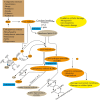ROS-modulated therapeutic approaches in cancer treatment
- PMID: 28647857
- PMCID: PMC11819417
- DOI: 10.1007/s00432-017-2464-9
ROS-modulated therapeutic approaches in cancer treatment
Abstract
Purpose: Reactive oxygen species (ROS) are produced in cancer cells as a result of increased metabolic rate, dysfunction of mitochondria, elevated cell signaling, expression of oncogenes and increased peroxisome activities. Certain level of ROS is required by cancer cells, above or below which lead to cytotoxicity in cancer cells. This biochemical aspect can be exploited to develop novel therapeutic agents to preferentially and selectively target cancer cells.
Methods: We searched various electronic databases including PubMed, Web of Science, and Google Scholar for peer-reviewed english-language articles. Selected articles ranging from research papers, clinical studies, and review articles on the ROS production in living systems, its role in cancer development and cancer treatment, and the role of microbiota in ROS-dependent cancer therapy were analyzed.
Results: This review highlights oxidative stress in tumors, underlying mechanisms of different relationships of ROS and cancer cells, different ROS-mediated therapeutic strategies and the emerging role of microbiota in cancer therapy.
Conclusion: Cancer cells exhibit increased ROS stress and disturbed redox homeostasis which lead to ROS adaptations. ROS-dependent anticancer therapies including ROS scavenging anticancer therapy and ROS boosting anticancer therapy have shown promising results in vitro as well as in vivo. In addition, response to cancer therapy is modulated by the human microbiota which plays a critical role in systemic body functions.
Keywords: Antioxidants; Cancer therapy; Microbiota; Pro-oxidants; Reactive oxygen species.
Conflict of interest statement
The authors declare that they have no conflict of interest.
Figures


References
Publication types
MeSH terms
Substances
LinkOut - more resources
Full Text Sources
Other Literature Sources

